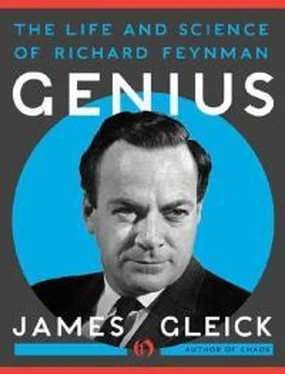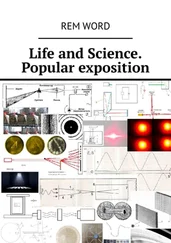Genius
The Life and Science of Richard Feynman
James Gleick
For my mother and father, Beth and Donen
I was born not knowing
and have only had a little time to change that here and there.
—Richard Feynman
CONTENTS
PROLOGUE
FAR ROCKAWAY
• Neither Country nor City • A Birth and a Death
• It’s Worth It • At School • All Things Are Made of Atoms • A Century of Progress • Richard and Julian MIT
• The Best Path • Socializing the Engineer • The Newest Physics • Shop Men • Feynman of Course Is Jewish • Forces in Molecules • I s He Good Enough?
PRINCETON
• A Quaint Ceremonious Village • Folds and Rhythms • Forward or Backward? • The Reasonable Man • Mr. X and the Nature of Time • Least Action in Quantum Mechanics • The Aura • The White Plague
• Preparing for War • The Manhattan Project •
Finishing Up
LOS ALAMOS
• The Man Comes In with His Briefcase • Chain
Reactions • The Battleship and the Mosquito Boat •
Diffusion • Computing by Brain • Computing by Machine • Fenced In • The Last Springtime • False Hopes • Nuclear Fear • I Will Bide My Time • We Scientists Are Clever
CORNELL
• The University at Peace • Phenomena Complex
—Laws Simple • They All Seem Ashes • Around a Mental Block • Shrinking the Infinities • Dyson • A Half-Assedly Thought-Out Pictorial Semi-Vision Thing • Schwinger’s Glory • My Machines Came from Too Far Away • There Was Also Presented (by Feynman) … • Cross-Country with Freeman Dyson •
Oppenheimer’s Surrender • Dyson Graphs, Feynman Diagrams • Away to a Fabulous Land CALTECH
• Faker from Copacabana • Alas, the Love of Women! • Onward with Physics • A Quantum Liquid •
New Particles, New Language • Murray • In Search of Genius • Weak Interactions • Toward a Domestic Life
• From QED to Genetics • Ghosts and Worms •
Room at the Bottom • All His Knowledge • The Explorers and the Tourists • The Swedish Prize •
Quarks and Partons • Teaching the Young • Do You
Think You Can Last On Forever? • Surely You’re Joking! • A Disaster of Technology EPILOGUE
ACKNOWLEDGMENTS
NOTES
A FEYNMAN BIBLIOGRAPHY
BIBLIOGRAPHY
INDEX
ILLUSTRATION CREDITS
PROLOGUE
Nothing is certain. This hopeful message went to an Albuquerque sanatorium from the secret world at Los Alamos. We lead a charmed life.
Afterward demons afflicted the bomb makers. J. Robert Oppenheimer made speeches about his shadowed soul, and other physicists began to feel his uneasiness at having handed humanity the power of self-destruction. Richard Feynman, younger and not so responsible, suffered a more private grief. He felt he possessed knowledge that set him alone and apart. It gnawed at him that ordinary people were living their ordinary lives oblivious to the nuclear doom that science had prepared for them. Why build roads and bridges meant to last a century? If only they knew what he knew, they surely would not bother. The war was over, a new era of science was beginning, and he was not at ease.
For a while he could hardly work—by day a boyish and excitable professor at Cornel University, by night wild in love, veering from freshman mixers (where women sidled away from this rubber-legged dancer claiming to be a scientist who had made the atomic bomb) to bars and brothels. Meanwhile new col eagues, young physicists and mathematicians of his own age, were seeing him for the first time and forming their quick impressions. “Half genius and half buffoon,” Freeman Dyson, himself a rising prodigy,
wrote his parents back in England. Feynman struck him as uproariously American—unbuttoned and burning with physical energy. It took him a while to realize how obsessively his new friend was tunneling into the very bedrock of modern science.
In the spring of 1948, stil in the shadow of the bomb they had made, twenty-seven physicists assembled at a resort hotel in the Pocono Mountains of northern Pennsylvania to confront a crisis in their understanding of the atom. With Oppenheimer’s help (he was now more than ever their spiritual leader) they had scraped together the thousand-odd dol ars needed to cover their rooms and train fare, along with a smal outlay for liquor. In the annals of science it was the last time but one that such men would meet in such circumstances, without ceremony or publicity. They were indulging a fantasy, that their work could remain a smal , personal, academic enterprise, invisible to most of the public, as it had been a decade before, when a modest building in Copenhagen served as the hub of their science.
They were not yet conscious of how effectively they had persuaded the public and the military to make physics a mission of high technology and expense. This meeting was closed to al but the few invited participants, the elite of physics. No transcript was kept. Next year most of these men would meet once more, hauling their two blackboards and
eighty-two
cocktail
and
brandy
glasses
in
Oppenheimer’s station wagon, but by then the modern era of physics had begun in earnest, science conducted on a scale the world had not seen, and never again would its
chiefs come together privately, just to work.
The bomb had shown the aptness of physics. The scientists had found enough sinew behind their penciled abstractions to change history. Yet in the cooler days after the war’s end, they realized how fragile their theory was.
They thought that quantum mechanics gave a crude, perhaps temporary, but at least workable way to make calculations about light and matter. When pressed, however, the theory gave wrong results. And not merely wrong—they were senseless. Who could love a theory that worked so neatly at first approximation and then, when a scientist tried to make the results more exact, broke down so grotesquely? The Europeans who had invented quantum physics had tried everything they could imagine to shore up the theory, without success.
How were these men to know anything? The mass of the electron? Up for grabs: a quick glance gave a reasonable number, a hard look gave infinity—nonsense. The very idea of mass was unsettled: mass was not exactly stuff, but not exactly energy, either. Feynman toyed with an extreme view. On the last page of his tiny olive-green dime-store address book, mostly for phone numbers of women (annotated dancer beauty or call when her nose is not red), he scrawled a near haiku.
Principles
Читать дальше












